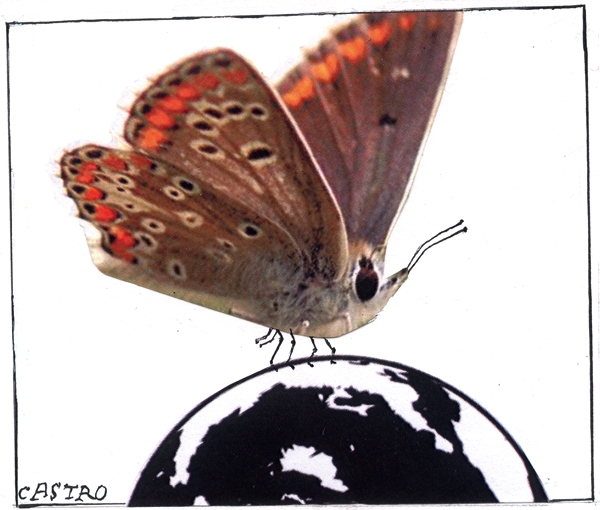Under such headlines as ‘British butterfly defies doom prediction to thrive in changing climate’, the usual suspects (e.g. the Guardian and the Independent) recently publicised a study claiming that, thanks to global warming, ‘a once-rare British butterfly’, the Brown Argus, ‘is becoming a common sight in the English countryside’. A paper from York University, it was reported, showed that these butterflies have moved so far north that they can now be seen ‘within a few miles’ of York. Not for the first time on reading similar claims, I wondered how it is that their authors seem to know so little about butterflies, My battered copy of the best book on British butterflies I know, published by Edmund Sandars in 1939, confirmed that 70 years ago the Brown Argus was found throughout Britain ‘as far north as Aberdeen’.
Attempts to use butterflies as evidence of global warming are popular with newspapers because it gives them an excuse to decorate their pages with pictures of our most colourful insects — although in the years when the warming scare was at its height, these more usually accompanied predictions that climate change was threatening them with extinction. Typical was a piece by Louise Gray in the Daily Telegraph in 2008, headed ‘Butterfly species may be lost to Britain through climate change’. Along with other evidence that she knew little about butterflies, this claimed that soaring temperatures could wipe out upland species such as the Mountain Ringlet altogether. But no explanation was offered for why these butterflies might find it any harder to survive than they did in those previous times, such as the early middle ages, when Britain was warmer than it is today.
We may have become familiar with how warmists like to call in aid of their cause almost any unusual weather event or passing change in climate patterns — none cited more often than that piece in the Independent in 2000 which quoted Dr David Viner (then with the East Anglia research unit later made famous by the ‘climategate emails’), predicting that winter snow would soon be ‘a rare and exciting event’ and that ‘children just aren’t going to know what snow is’. But it is not only the warmist fraternity who like to pluck eye-catching claims from the natural world without showing that they have any real familiarity with it or any proper scientific perspective.
Anyone observing the changes in Britain’s countryside over the past 60 years will be keenly aware that the dismal decline in so many species of birds, flowers, butterflies and other insects has been a real tragedy of our time. Back in the late 1960s the Observer published a widely quoted article headed ‘Where have all the butterflies gone?’, in which a learned professor blamed their disappearance entirely on pesticides. These had contributed, I wrote in these pages, but the greater part of the damage had resulted from destruction of their habitats, not least the wholesale devastation of the flower-rich grasslands which provided them with their food plants. Only the previous year a chalk hillside on which I had regularly seen 20 species of butterfly had been ploughed up, thanks to a government grant, with the result that a stretch of downland formerly pulsating with life and colour now showed only the occasional solitary cabbage white fluttering forlornly over a dead expanse of sterile ryegrass.
Obviously the onslaught of modern farming methods has played a major part in the catastrophic disappearance of so many forms of wildlife once common in our countryside. But even here there are mysteries still not fully understood, such as the vanishing of so many migratory birds, such as cuckoos, nightingales and warblers. Is the damage being done here in Britain or somewhere else on their route between here and Africa? And if it is the latter, why do some birds, such as cuckoos, still return to parts of Britain, such as the Scottish hills, but not to others?
It has long been remarkable how little we know about what causes many of the more puzzling rises and falls in wildlife populations. Back in the 1960s, for instance, I recall an experienced ornithologist with whom I was watching a large flock of house sparrows in a Dorset garden observing that the explosion in their numbers since 1945 had been one of the more remarkable phenomena of post-war Britain. Yet today their numbers have again declined. We may note how starlings are now less common than they were 20 years ago. Yet 200 years ago starlings were so rare in large parts of England that they were only first recorded as breeding in Devon in 1830. Who can explain why in the 1840s the once common Comma butterfly began such a retreat that by 1924 it was only found around Hereford? Its range then expanded again until, by 1969, it was so abundant across southern England that in a Spectator diary I called it ‘the year of the Comma’.
All these fluctuations were taking place long before they could be blamed on climate change or the rise of modern agriculture. I end by recalling how some years back, when we had warmer summers and snow-less winters, much attention was drawn to the markedly earlier flowering of many plants. It was regularly reported that the sight of primroses in December or hawthorn flowering in early rather than late May was clear evidence of global warming. Two years ago I was startled to see ‘May blossom’ on 25 April, by far the earliest date I could remember. Yet this year the frozen firework displays of hawthorn flowers were only exploding along West Country hedgerows on 22 May, at just the time when their appearance was familiar years ago. It was quite a reversal. But none of those journalists once so quick to tell us that daffodils in January were proof of global warming seemed to think it worthy of notice. What a surprise.






Comments